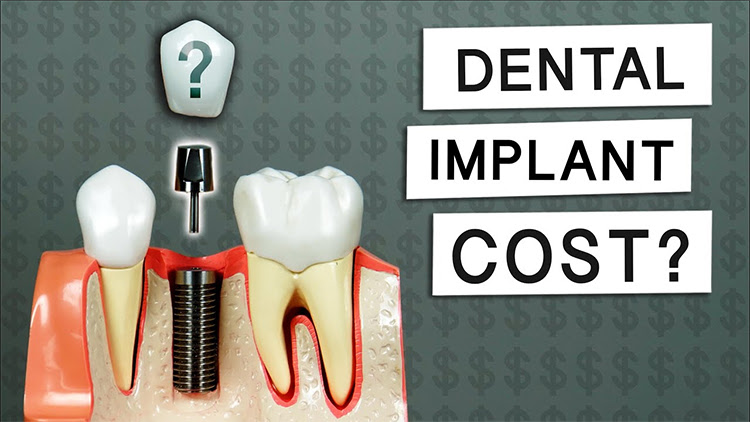How Much Do Dental Implants Cost While dental implants are widely considered to be the most effective solution for damaged, unhealthy or missing teeth, their price range can come as a surprise to many. The high cost of dental implants is due in part to the fact that the procedure involves multiple steps, including consultations, imaging scans, surgery, and follow-up appointments. In addition, the materials used in implants such as titanium fixtures and ceramic crowns are of high quality and add to the overall cost. However, it’s important to keep in mind that dental implants offer long-term benefits such as improved oral health, increased functionality and aesthetics compared to other tooth replacement options like dentures or bridges. Some insurance plans may also cover a portion of the cost of dental implants so it’s worth checking with your provider. Ultimately, the investment in dental implants pays off by providing a permanent solution that enhances your quality of life and overall well-being.
Outlines Of Guide
ToggleHow Much Do Dental Implants Cost?
The costs of dental implant procedures can vary widely because each procedure is unique and involves multiple parts, according to Roger Levin, D.D.S., CEO of the Levin Group, Inc., a dental management consultancy. Different fees apply to each part of the procedure. The components that factor into the ultimate price of your new tooth or teeth comprise:
- Comprehensive dental exam, including 3D imaging
- Extraction of problem teeth, if necessary
- Installation of the dental implant(s)
- Placement of the abutment hardware
- Fabrication of the dental crown
- Placement of the crown
The cost of each element varies depending on the dental practice. Some dental practices may provide a complimentary computed tomography (CT) scan at the start of the process as a bonus (the CT scan is used to assess your suitability for dental implants). However, if you have to cover the cost of the 3D imaging, the service could range from $350 to $515. In general, implants are a long-term investment and are priced accordingly. Levin suggests that the total cost per tooth, from start to finish, typically falls between $3,000 and $4,500, and an individual requiring multiple implants could face a final cost ranging from $60,000 to $90,000.
The absence of a standard price for dental implants is due to the unique nature of each procedure. Factors such as the type and complexity of the work, the need for additional procedures like CT scans, sinus lifts, or bone grafts, and the location of the practitioner all contribute to the final cost. Therefore, it is advisable to inquire about the specific cost for your case in advance.
The Cost of a Single Tooth Implant
Just purchasing an implant doesn’t cover everything – it only includes the metal or ceramic screw inserted into the jawbone. You also require an abutment (which connects the crown to the implant) and the crown, each with its own cost. Additionally, some patients may need a sinus lift or bone graft to ensure the jawbone can support the implant, which further increases the expenses. According to the cost survey conducted by the American Dental Association’s Health Policy Institute, the complete expense for an implant, abutment, crown, and additional essential procedures varies from $3,100 to $5,800.
The Cost of a Multiple Tooth Implant
When replacing multiple adjacent teeth, you have a wider range of implant options, which means more pricing choices are available. For instance, when filling a space of three or four adjacent teeth, it may be possible to utilize a bridge anchored by only two implants, reducing the overall cost to approximately $6,000 to $10,000. This is a more cost-effective option compared to using four separate implants, as two implants can support three or four neighboring teeth.
The Cost of a Full Mouth Implant
Full-mouth tooth replacement can be approached in various ways, resulting in a wide range of pricing. Opting for individual tooth replacement is the most costly but offers the highest level of comfort, allowing the preservation of existing healthy teeth. This option generally costs between $60,000 and $90,000. Implant-supported dentures offer a more affordable alternative, consisting of two full arches of false teeth replacing the natural upper and lower teeth, similar to non-implant-supported dentures. The arch is attached to four to six implants in each the upper and lower jaw. Referred to as All-on-4, this option usually costs between $24,000 and $50,000 for a full set.
Additional Costs of Dental Implants
Ensure that you have a discussion with your dentist about pricing and fully comprehend the costs involved. According to Levin, hidden costs are very uncommon, and most dentists will disclose the complete cost from the beginning. If you are consulting multiple specialists like a dentist and an oral surgeon, be sure to consider the fees for both.
You may incur extra costs for over-the-counter or prescription medications, such as painkillers following certain procedures or antibiotics before or after treatment if recommended by the dentist. Dental implantation is a lengthy process, so you will spread the costs over several months. If you require a payment plan, the majority of dentists, around 80%, offer them, usually through CareCredit, LLC, which is the largest dental-financing group.
Does Insurance Cover Dental Implants?
In the past, dental insurance providers did not usually cover the costs of implants, considering them to be optional. However, coverage for implants is now increasing, with insurance paying a larger portion of the costs each year. Dental insurance now generally contributes a percentage towards the total cost of implants, with the specific amount varying depending on the procedure. Additionally, there may be a limit on the reimbursement amount for a particular calendar year or for a lifetime for a specific procedure.
If you are covered by dental insurance, you can anticipate receiving reimbursement of approximately $1,500 per implant annually. If your implant treatment spans two consecutive years, you may be eligible for reimbursement for both years. Flexible spending accounts (FSAs), health reimbursement accounts (HRAs), and health savings accounts (HSAs) all provide coverage for dental implant expenses. These accounts operate similarly by either paying for or reimbursing incurred expenses, which may include the variance between your insurance coverage and out-of-pocket costs. It is important to verify the coverage details with your insurance provider or administrator before proceeding with the procedures to understand your financial responsibilities.
How much does 1 tooth implant cost in India?
| Type of treatment | Min.Cost | Max.Cost |
|---|---|---|
| Single Tooth Implant | 30,000 रु. | ₹50,000 |
| Implant-Supported Bridge | ₹15,000 | ₹25,000 |
| All-on-4 Dental Implants | ₹1,50,000 | ₹2,50,000 |
| 3-on-6 Dental Implants | ₹2,50,000 | ₹7,00,000 |










































